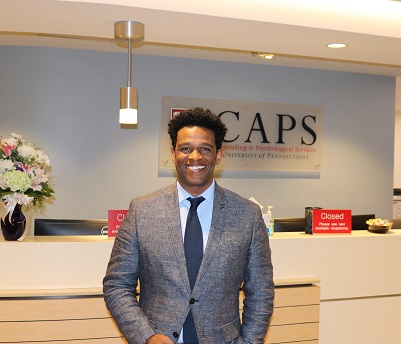This month’s professional spotlight features Yacob Tekie, Staff Psychologist and “Let’s Talk” Program Coordinator at the Counseling & Psychological Services, University of Pennsylvania (UPenn), Philadelphia, PA. Read this month’s spotlight to learn more about Yacob, his work, and his path to becoming a psychologist.
Could you briefly explain some of your responsibilities in your current career role.
My role is two-fold. The first half is to provide a weekly or bi-weekly counseling service to UPenn students, conduct mental health related outreach to members of the campus community, provide clinical supervision to a psychology PhD student as well as provide different administrative services.
The second half is spearheading a new program, called “Let’s Talk”. The program is a social justice based informal consultation that provides an easy access to undergraduate and graduate students to drop-in without an appointment to discuss any issues they may have.
Also, apart from my regular job, I do extensive community and consultation work with immigrant communities across the US and Europe to address the mental health issues in East African community, especially Eritreans and Ethiopians. We provide data driven seminars and create discussions on mental health among the diaspora and recently resettled refugees. So far, in a little over two years, we have conducted workshops in over ten cities for over 1200 individuals. In addition, we are scheduling similar workshops in 2020 in New Jersey, District of Columbia, Alexandria, Las Vegas, Colorado, Canada, Sweden, and the UK.
How did you come to decide that this was the right career path for you?
This is a long story, but it’s a combination of different life events. First, during and after the border conflict between Eritrea and Ethiopia, I noticed my siblings and friends becoming different, emotionally and behaviorally, which I would call it now- they were struggling with Post-Traumatic Stress Disorder (PTSD). Similarly, my interaction with recently migrated and resettled Eritrean refugees exposed to me multiple and complex trauma that shifted my approach to the world. Finally, while in graduate school, I was trying to find mental health related scientific articles conducted among Eritrean refugees. After surfing through millions of articles, to my surprise and shock, I couldn’t find a single article that directly talk about mental health issues among Eritreans. So sad! In a swift decision, in consultation with my advisor, I changed my research and clinical route to focus on refugees and immigrants, especially Eritreans. As a result, my dissertation focused on “How Meaning-making and social support help Eritrean trauma survivors, deal against Post-traumatic stress disorder.”
Is there a philosophy that drives your career?
I strongly believe in human rights and social justice. From an early age, my parents taught me that human connection and justice are the engines of our survival. I noticed my father never lost his humbleness and kindness despite shifting in his economic status, migration or torture. The respect he had for humanity, in general, and his community in particular always amazes me and he set a concrete model for me. Thus, all the professional work I do, whether individual counseling, community interventions or consultation, is social justice based and advocacy flavored.
What do you consider to be your greatest professional accomplishment?
First, I remember when I got admission to graduate school, I asked my advisor/mentor why he gave me admission out of a pool of hundreds of applicants. He said, “I believe you can contribute to the science of psychology and make a difference in humanity…” At the time, I was in Asmara having a cappuccino with my friend, and with a surprise, I said, “Me! No way…” Fast forward many years, I found myself writing letters to the US congress to advocate for Eritrean asylum seekers. I have traveled to more than a dozen cities across the US and Europe to provide mental health related workshops and seminars to my own Eritrean community, and advocate for asylum seekers who are torture and trauma survivors.
On the other hand, when I first started the community mental health workshops to the Eri diaspora community, I faced a lot of challenges including people saying “…this [e.g., depression] is White people’s problem….We are strong, we don’t suffer from psychological issues…..who sent you? Are you pro government [Eritrean] or against the government? …Are you trying to defame the government? Who pays you? …etc.” Few years forward, I get tons of texts and requests from individuals and Eritrean/Ethiopian communities across the world asking for support and open to talk about mental health issues. Even though we have a lot of work to do and a long way to walk, I think this is the most humbling experience, perhaps the most satisfying accomplishment for me, especially delivering workshops in my own mother tongue, Tigrigna. At the end of the day, contributing to humanity and being a defender of human rights is what gives me peace of mind and I will do it over and over again.
What’s one piece of advice you would give someone looking to transition into your line of work?
Psychology and related mental health professions are very challenging, but outstandingly rewarding. It might not look like a lucrative job, but you can make a difference and help, not only yourself, but your community and the world. It’s a very noble, meaningful and purposeful job.
Why do you feel mental health is important in the Eritrean community?
I think this would require a full day conversation. But despite how resilient and adaptive our community is, it has endured multigenerational trauma, war, migration, colonization and oppression, which naturally affects our coping and wellbeing. These kinds of traumatic life events affect, not only the psychological and emotional wellbeing of the person, but also how they relate to others and the world, including how they raise their children, adjustment, and resettlement to new environments. In my experience, I have done numerous studies (in the process of publication), conducted interviews to understand their traumatic experience, as well as worked closely with different Eritrean communities across the US and Europe. The stories I hear everyday from Eritrean refugees who are trauma and torture survivors, is hard to fit to my schema. I would imagine, even Hollywood would struggle to recreate their narratives in a movie. I am talking about multiple tortures, surviving sexual abuse, rape, kidnapping, etc. They literally cheat death multiple times. The psychological impact of their traumatic experience is not only on themselves, but their significant others too, be it their children, parents or friends.
On the other hand, even though some people might not identify as a refugee or might have been born and raised, for example, in the US, they experience a different form of trauma, including racial trauma, microaggression, acculturation issues, especially navigating two different culture, an Eritrean culture at home and an American culture in school or work. Sometimes you would see parents not understanding their children’s mental health needs because some parents might have come to the US 20 or 30 years ago, and they might still live in the Eritrean culture that was 20 or 30 years ago. This, potentially could create conflict between parents and their children, even parents in the diaspora and their families back in Eritrea. The reasons are endless, but one thing that people need to know is, the impact of mental health on our lives and community is pervasive and needs to be addressed. Otherwise, we will continue to lose a generation to anxiety and depression.
What are three pieces of advice you would give someone seeking out mental health assistance?
Seeking help is courageous and powerful! Step out of your way to seek help or offer help. Do not carry the burden on your own, share your emotions and remember, Emotions Are Superpowers!
Outside of all of your hard work and efforts toward building your brand, what do you do for fun? Hobbies?
First, I am not sure how I developed the habit, but work and personal life are two separate things. When I am at work, I rarely think about my home or other personal stuff. When I leave work, literally leave my office, I do not remember anything about all the life atrocities I hear everyday from my clients.
When I am stressed or need to calm myself down, I usually pick up my camera and go for a walk or drive. I love architecture and nature and it’s a good way to zone out of the stressful world and mindfully live in the moment. My camera lenses help me shift my perspective and see things differently where it takes me to a unique space. Also, when time allows, I like to go hiking, paint, or pick up my woodwork tools and build something. But all these things won’t survive without talking to my family or friends, who are my main source of happiness.


I am an African American, Licensed Marriage and Family Therapist married to an Eritrean, who is a publisher. We are both amazed, impressed and proud of you and your contributions. He will be reaching out to you..
You have got a good heart based on humanity!!
That would drives you forward despite the heavy burden of the mental problems of the Eritrean communities you are trying to carry.
You are the right response to the poor Eritrean people.
Contact me because I have been working on Social Psychology of the Eritrean highlanders.We can share ideas to help our people.
Thanks for sharing Dr Yacob’s noble work in assisting people with mental health needs. We need more of him to tackle what arguably has become one of the biggest challenges of the diaspora.
I have done mental health and suicide prevention advocacy volunteer work for more than 22 years now, mostly supporting Eritreans in Toronto and vicinity. The need is huge.
May Dr Yacob continue to blossom with his work. This indeed is a most fulfilling call.
a
I can now more closely see, what can come out, when someone with the an understanding and a character which Jacob mentioned, which I also witness, gets equipped with with what he needs.
I am glad to see you doing this service and getting stronger and humbler.
As an Eritrean, I can say thousands of problems.
Let me contact you and tell you some thing unique of all er. Experience.
You are a truly God given in a timely need help for our community. Keep up the good work as our community in large looks up on you.